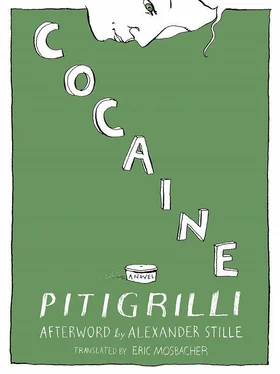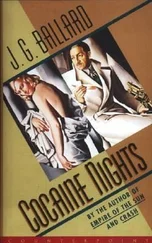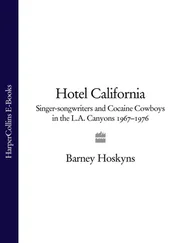If you know how deliciously perfumed tears become when they run down a pretty woman’s cheeks, and how deliciously perfumed ties become when she weeps on them.
Tito’s tie was wet, but his heart was lighter. Cocaine’s heart too was light and as luminous as an Andalusian mantilla.
“Your article has had marvelous results,” she said.
“I know,” Tito replied with a bitter smile.
“I’ve just been talking to a big American impresario. We’re leaving for Buenos Aires in a week’s time. Will your newspaper let you come with me?”
“Yes,” Tito replied simply.
“Will it allow you six months?”
“Even twelve. And what are the terms?”
“Excellent.”
And she hurried to give the news to her lady’s maid, who answered, sometimes arrogantly, to the name of Pierina.
When Csaky, the butler, announced M. Arnaudi (whom he no longer referred to as “the gentleman”) was asking for her, Kalantan was not surprised. She was used to his longer and shorter periods of melancholy and misanthropy and knew how changeable his moods were, and she felt sure that habit, if not inevitable destiny, would bring him back to her.
But he seemed strangely different; there was something forced and artificial in his behavior, and he no longer abandoned himself so completely when he made love to her.
“Your room is as you left it,” she said to him, stroking his hair. “And my love is unchanged too.”
In fact that night Tito felt that his beautiful, vice-ridden Armenian mistress gave herself to him with the same passion for simplicity as before; and when he woke up next morning in the rosewood bed he recognized the furniture and the prints on the walls and the impressive and decorative livery of Csaky, the butler, who asked whether “the gentleman” wanted Russian tea, green tea or Ceylon tea.
“I’ll have it in the lady’s room,” he said.
He went to Kalantan’s room; she was still asleep, with her hands and knees drawn up to her chin, completely enclosed in herself, just like a magnolia asleep at night.
Later he slowly dressed, carefully tied the green knitted tie with blue diagonal stripes that had been perfumed by Cocaine’s tears, and went to the Hotel Napoléon to fetch some things.
“Don’t be long,” said Kalantan.
“I’ll be back in half an hour,” he replied.
In fact half an hour later Madame Ter-Gregorianz’s car arrived in the garden with two big yellow suitcases.
Tito’s nights were restless. In the evening he took strong doses of chloral to overcome the insomnia produced by the drug he could not give up. The result of the incurable insomnia and the useless drug was a hallucinatory state; he spent long hours in a state of wakefulness in which he felt he was dreaming and in a state of sleep in which he felt he was awake. Being in this villa as white as an ossuary as guest and lover of a woman of Asian passions, being waited on by servants who treated him as coldly and obsequiously as if he were a usurper; the whole of this quasi-oriental environment set up in the heart of Paris for the purpose of creating a legendary Caucasian atmosphere all round him, and the idea of Maud, of his Cocaine, only five minutes away by car, though his impression now was that she was far, far away, fading and getting lost in the distance — all this added up in his mind to a multi-colored musical beehive, the buzzing of which was interrupted from time to time by the sentimentally ironic, epigrammatic chirping of a bird that was in love in the garden.
At the hotel they gave him a letter from his friend the novice monk, who prayed for him every evening, and he found Cocaine busy trying on a graceful garment of mauve crêpe-de-Chine adorned with fine organdy pleats.
“Do you know, Tito, that I’m getting fat?” Cocaine said to him with a laugh.
“Yes, I do.”
He certainly knew it, he had expected it. This was the first sign, the beginning of the decline. The cruel mutilation to which she had submitted the year before was now beginning to confirm the saying that woman is woman only because of her generative gland.
All feminine charm, the delicacy of outline, the softness of the limbs, the development of the breasts, the flowing abundance of the hair, the musical subtlety of the voice, depend on that gland. With its removal the harmonious line changes into obesity, the voice becomes masculine, the liveliness of the mind degenerates into loss of memory, the affectionate nature gives way to hypochondria and irritability, a hairy shadow appears on the lip and an expression of surliness comes into the eyes; and after a few years we find ourselves with a virago in all her hybrid hatefulness.
But Tito was so much in love with this woman that he wanted to hasten the day when she would be as ugly as that. No one else will want her, he said to himself, and then at last she’ll be mine alone. And then I shall have the only joy of which I dream: that of being her last lover.
And when she asked him to touch her and actually feel that she was getting fat, he hugged her so fiercely that she called out: “Be careful, you’re spoiling my organdy pleats.”
The dog started barking in her defense.
But all that Tito could see was the beginning of plumpness, the first stage of the downward trend that would end with her coming back to him.
It was the first gleam of hope that appeared in what was a kind of amorous irredentism.
Csaky, the Ter-Gregorianz butler, looked at him with respectful but venomous eyes.
“Madam is out,” he announced. “Your room is ready, sir.”
Late every afternoon Kalantan used to go to a physiotherapy establishment where she subjected herself to illusory treatment for an imaginary complaint, and she came back after sunset with flowers at her waist. The first thing she did was to go to Tito’s room without asking the servants, to enjoy the pleasure of surprise.
When he wasn’t there she assured herself that he would be coming next day.
Then she went back to her room to be undressed by Sonya, a lady’s maid of the old type.
One evening Csaky said to her: “The gentleman has had to leave suddenly for Italy.”
“Oh? Did he leave any letters?”
“No, madam.”
“Did you take him to the station?”
“No, madam. I took him to his hotel.”
“Did he leave his suitcases?”
“He took them, madam. But he left some clothes.”
“Very well. You may go.”
She put down her flowers, undid her belt, took off her hat, and dropped her veil on the velvet and tin box that constituted her “past.” The box that contained the memories of pleasure given to another man. The box full of coins her husband had given her to create the illusion that she was something better than a wife: a courtesan.
The box that made poor Tito suffer so much that he had broken it open to learn its secrets and emptied the contents into his two yellow suitcases, among his handkerchiefs and ties, his antelope gloves and his foulard pajamas.
Kalantan, who like all women was incapable of understanding jealousy, particularly jealousy of the past, smiled to herself indulgently as she thought of Tito’s anguish when to reassure him she had said to him: “Darling, the past has nothing to do with us.”
It no longer has anything to do with us when it has been stolen and taken in two yellow suitcases to distant South America.
No sooner had the ship left harbor than Maud started flirting with passengers of various nationalities. And, as the sea was terribly rough throughout the passage, Tito hardly ever left his cabin.
Someone told him that the best way of getting rid of seasickness was to eat nothing. So Tito ate nothing.
Others advised him to eat. So he ate.
An elderly, very religious lady gave him some anti-hysteria water from Santa Maria Novella. He drank it.
Читать дальше



